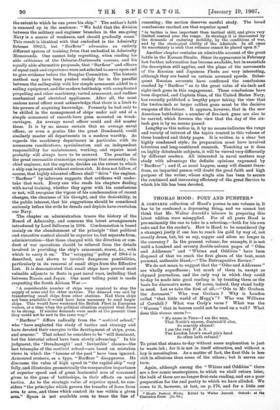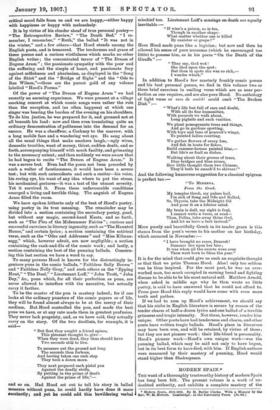THOMAS HOOD : POET AND PUNSTER.*
A COMPLETE collection of Hood's poems in one volume is, it has to be confessed, a depressing thing, and we cannot but think that Mr. Walter Jerrold's labours in preparing this latest edition were misapplied. For of all poets Hood is pre-eminently the one to take in a selection,—both for his own sake and for the reader's. How is Hood to be considered (by a stranger) justly if one has to reach his gold by way of, not exactly dross, but, let us say, copper and silver no longer in the currency P In the present volume, for example, it is not until a hundred and seventy double-column pages of " Odes and Addresses" and "Whims and Oddities" have been disposed of that we reach the first gleam of the best, most personal, authentic Hood,—" The Retrospective Review."
We do not mean to suggest that the " Odes and Addresses " are wholly superfluous ; but much of them is, except as rhymed journalism, and the only way in which they could to-day be made into good reading is by treating them as the basis for discursive notes. Of notes, indeed, they stand badly in need. Let us take the first of all,—" Ode to Mr. Graham the Aeronaut." Who was Graham ? Why is London called "that little world of Hogg's" P Who was Williams of Cornhill ? What was Croly's verse ? What was the " Warren" that in heaven could not be read on a wall ? What
does this stanza mean ?—
" My name is Tims—I am the man, That North's unseen, diminish'd clan, So scurvily abused
I am the very P. A. Z.
The London Lion's small pin's head So often hath refused."
To print that stanza to-day without some explanation is just to waste ink ; for it is not in itself attractive, and without a key is meaningless. As a matter of fact, the first Ode is less rich in allusions than some of the others ; but it serves our
turn.
Again, although among the " Whims and Oddities" there are a few comic masterpieces, to which we shall return later, the bulk of them are no longer first-rate reading, and are a poor preparation for the real poetry to which we have alluded. We come to it, however, at last, on p. 176, and for a little our
Edited by Walter Jerrold. Oxford: at the
critical mood falls from us and we are happy,—either happy with happiness or happy with melancholy.
It is by virtue of his slender sheaf of true personal poetry- " The Retrospective Review," " The Death Bed," " I re- member, I remember," "Ruth," the ballad "It was not in the winter," and a few others—that Hood stands among the English poets, and is treasured. The tenderness and grace of these poems and a curious wistfulness which marks no other English writer ; the concentrated terror of "The Dream of Eugene Aram" ; the passionate sympathy with the poor and the suffering and the simple of heart, and passionate fury against selfishness and pharisaism, as displayed in the "Song of the Shirt" and the " Bridge of Sighs " and the " Ode to Rae Wilson,"—these are the purest gold of any volume labelled "Hood's Poems."
Of the power of "The Dream of Eugene Aram " we had recently an amusing experience. We were present at a village smoking concert at which comic songs were rather the rule than the exception, and (as often happens) at which one singer was bearing the burden of the evening on his shoulders. To do him justice, he was prepared for it, and groaned not at all beneath his load : now and then even translating quite an ordinary demonstration of politeness into the demand for an encore. He was a chauffeur, a Cockney to the marrow, with a long mobile face and a wandering wet eye. He sang about all the usual things that make smokers laugh,—ugly wives, domestic troubles, want of money, thirst, sudden death, and so forth, accompanying himself with much facility, and grimacing to the necessary extent; and then suddenly we were aware that he had begun to recite " The Dream of Eugene Aram." It was a severe test. Even had the poem not been preceded by such a welter of facetiousness, it would have been a severe test ; but with such antecedents and such a reciter—his voice, his roving eye, his want of any idea where to put the stress, his mechanical gestures—it was a test of the utmost severity. Yet it survived it. From these unfavourable conditions emerged a living and terrible thing. The anguish of Eugene Aram filled the room.
We have spoken hitherto only of the best of Rood's poetry, using poetry in its true meaning. The remainder may be divided into a section containing the secondary poetry, good, but without any magic, second-hand Keats, and so forth, such as "The Plea of the Midsummer Fairies "; curious and successful exercises in literary ingenuity, such as "The Haunted Rouse," and certain lyrics ; a section containing the satirical verse, such as the "Odes and Addresses" and "Miss Kilman- segg," which, however adroit, are now negligible ; a section containing the rank-and-file of the comic work ; and lastly, a section containing the beet of the punning ballads. Concern- ing this last section we have a word to say.
To many persons Hood is known for the distractingly in- genious puns in the comic ballads, " Faithless Sally Brown" and "Faithless Nelly Gray," and such others as the "Epping Hunt," " The Duel," " Lieutenant Luff," "John Trott, " John Day," &c., puns which, for all their perfection as puns, are never allowed to interfere with the narrative, but actually carry it farther.
To be the master of the pun is mastery indeed ; for if one looks at the ordinary punsters of the comic papers or of life, they will be found almost always to be at the mercy of their medium. But Hood controlled the pun, and made the best puns we have, or at any rate made them in greatest profusion. They never lack propriety, and, as we have said, they actually carry on the story. Of the two duellists, for example, it is said—
"But first they sought a friend apiece,
This pleasant thought to give—
When they were dead, they thus should have Two seconds still to live.
To measure out the ground not long The seconds then forbore, And having taken one rash step They took a dozen more.
They next prepared each pistol pan Against the deadly strife, By putting in the prime of death
Against the prime of life,"— and so en. Had Hood set out to tell his story in ballad measure without puns, lie could hardly have done it more Inecinetlit and yet be could add this bewildering verbal mischief too. Lieutenant Luff's musings on death are equally
inevitable :—
"If wine's a poison, so is tea,
Though in another shape What matter whether one is killed By canister or grape ?"
Here Hood made puns like a logician ; but now and then he allowed his sense of pure nonsense (which he encouraged too little) to possess him, as in his poem "On the Death of the Giraffe " "They say, God wet !
She died upon the spot: But then in spots she was so rich,— I wonder which."
In addition to Hood's few masterly frankly comic poems and his best personal poems, we find in this volume two or three brief exercises in smiling verse which are as near per- fection as one requires, and are also pure Hood. No anthology of light verse or very de sociite could omit "The Broken Dish" :—
" What's life but full of care and doubt, With all its fine humanities, With parasols we walk about, Long pigtails and such vanities.
We plant pomegranate trees and things, And go in gardens sporting, With toys and fans of peacock's wings, To painted ladies courting.
We gather flowers of every hue, And fish in boats for fishes,
Build summer-houses painted blue,—
But life's as frail as dishes.
Walking about their groves of trees, Blue bridges and blue rivers,
How little thought them two Chinese, They'd both be smash'd to shivers !"
And the following humorous suggestion for a classical epigram
is perfect too :— " To MINERVA.
Prom the Greek.
My temples throb, my pulses boil, I'm sick of Song and Ode and Ballad, So, Thyrsis, take the Midnight Oil And pour it on a lobster salad.
My brain is dull, my sight is foul, I cannot write a verse, or read— Then, Pallas, take away thine Owl, And let us have a lark instead."
More purely and beautifully Greek in its tender grace is this stanza from the poet's verses to his mother on her birthday, which occurred in November— "I have brought no roses, Dearest !
Summer lies upon her bier; It was when all the sweets were over Thou wart born to bless the year."
It is for the mind that could give us such an exquisite thought as that that we prize Thomas Hood. Alas! only too seldom was he thus inspired. For the most part, he was an over- worked man, too much occupied in earning bread and fighting disease to be able to be his most natural self. Matthew Arnold, when asked in middle age why he then wrote so little poetry, is said to have answered that he could not afford to. From poor Hood this reply would have come with even more truth and pathos.
If we had to sum up Hood's achievement, we should say that his niche in English literature is secure by reason of the tender charm of half-a-dozen lyrics and one ballad of a terrible grimness and tragic intensity. Not these, however, render him unique. Other poets have had tenderness and charm, and other poets have written tragic ballads. Hood's place in literature may have been won, and will be retained, by virtue of these ; but they are not pioneer work : their life-blood is personality. Hood's pioneer work—Hood's own unique work—was the punning ballad, which may be said not only to have begun, but in its best form to have died, with him. If English authors were measured by their mastery of punning, Hood would stand higher than Shakespeare.







































 Previous page
Previous page